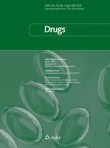
Abstract
Background
ARCHER 1050, an ongoing, randomized, open-label, phase III trial of dacomitinib versus gefitinib in newly diagnosed patients with advanced non-small-cell lung cancer (NSCLC) and an EGFR-activating mutation, reported significant improvement in overall survival (OS) with dacomitinib.
Objective
This paper reports an updated OS analysis of ARCHER 1050 after an extended follow-up.
Patients and methods
In this multinational, multicenter trial, adults (aged ≥ 18 years or ≥ 20 years in Japan and Korea) with newly diagnosed NSCLC and EGFR mutation (exon 19 deletion or exon 21 L858R substitution), and no history of central nervous system metastases, were randomized 1:1 to receive dacomitinib 45 mg/day (n = 227) or gefitinib 250 mg/day (n = 225). Randomization was stratified by race and EGFR mutation type. An ad hoc updated analysis of OS was conducted at the protocol-defined cut-off of 48 months from first dosing of the last enrolled patient (13 May 2019).
Results
After a median follow-up of 47.9 months, 133 (58.6%) patients had died in the dacomitinib arm and 152 (67.6%) in the gefitinib arm. The hazard ratio (HR) for OS was 0.748 (95% CI 0.591–0.947; two-sided P = 0.0155); median OS was 34.1 months with dacomitinib versus 27.0 months with gefitinib. The HR for OS in patients with dose reduction(s) in the dacomitinib arm (n = 154) compared with all patients in the gefitinib arm was 0.554 (95% CI 0.420–0.730); median OS was 42.5 months for patients with dose reduction(s) in the dacomitinib arm. The most common adverse events were diarrhea (87.7%), paronychia (61.7%), dermatitis acneiform (49.3%), and stomatitis (43.6%) with dacomitinib, and diarrhea (55.8%) and alanine aminotransferase increased (40.2%) with gefitinib.
Conclusions
The OS benefit from first-line treatment with dacomitinib versus gefitinib was maintained after extended follow-up in patients with advanced NSCLC with EGFR-activating mutations.
ClinicalTrials.gov
NCT01774721 (registered 24 January 2013).



No comments:
Post a Comment